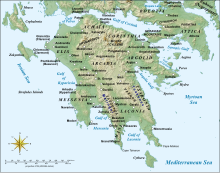| Barony of Patras | |||||||
|---|---|---|---|---|---|---|---|
| Barony of the Principality of Achaea | |||||||
| 1209–1429/30 | |||||||
 Map of the Peloponnese with its principal locations during the late Middle Ages | |||||||
| Capital | Patras | ||||||
| Area | |||||||
| • Coordinates | 38°15′N 21°44′E / 38.250°N 21.733°E | ||||||
| • Type | Feudal lordship | ||||||
| Historical era | Middle Ages | ||||||
• Established | 1209 | ||||||
• Independence from Achaea | 1337 | ||||||
• Venetian administration | 1408–13 | ||||||
• Byzantine reconquest | 1429/30 | ||||||
| |||||||
The Barony of Patras was a medieval Frankish fiefdom of the Principality of Achaea, located in the northwestern coast of the Peloponnese peninsula in Greece, centred on the town of Patras. It was among the twelve original baronies of the Principality of Achaea, but passed into the hands of the Latin Archbishop of Patras at about the middle of the 13th century. From 1337 on, Patras was an ecclesiastical domain de facto independent of the Principality, although the archbishops still recognized its suzerainty for their secular fiefs. The archbishops maintained close relations with the Republic of Venice, which governed the barony in 1408–1413 and 1418. The barony survived until the Byzantine reconquest in 1429–30.